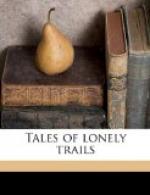Two things sustained me in this ordeal, which was the crudest horseback ride I ever had—first, the conviction that I could cure my ills by enduring the agony of violent action, of hot sun, of hard bed; and secondly, the knowledge that after it was all over the remembrance of hardship and achievement would be singularly sweet. So it had been in the case of the five days on the old Crook road in 1918, when extreme worry and tremendous exertion had made the hours hideous. So it had been with other arduous and poignant experiences. A poet said that the crown of sorrow was in remembering happier times: I believed that there was a great deal of happiness in remembering times of stress, of despair, of extreme and hazardous effort. Anyway, without these two feelings in my mind I would have given up riding Don Carlos that day, and have abandoned the trip.
We covered twenty-two miles by sundown, a rather poor day’s showing; and camped on the bare flat desert, using water and wood we had packed with us. The last thing I remembered, as my eyes closed heavily, was what a blessing it was to rest and to sleep.
Next day we sheered off to the southward, heading toward Chevelon Butte, a black cedared mountain, rising lone out of the desert, thirty miles away. We crossed two streams bank full of water, a circumstance I never before saw in Arizona. Everywhere too the grass was high. We climbed gradually all day, everybody sunburned and weary, the horses settling down to save themselves; and we camped high up on the desert plateau, six thousand feet above sea level, where it was windy, cool, and fragrant with sage and cedar. Except the first few, the hours of this day each marked a little less torture for me; but at that I fell off Don Carlos when we halted. And I was not able to do my share of the camp work. R.C. was not as spry and chipper as I had seen him, a fact from which I gathered infinite consolation. Misery loves company.




